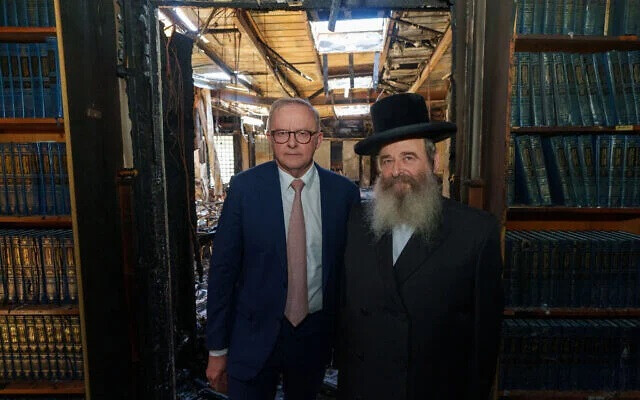
Australian Jewish community leaders have expressed general disappointment with the re-election of center-left Prime Minister Anthony Albanese in the recent general election, but have also conveyed hope that the new government will take stronger measures against the rising anti-Semitism in the country.
Albanese's Labor Party strengthened its position as the ruling party by overwhelmingly defeating Peter Dutton and his conservative Liberal Party. However, Jewish organizations have criticized the Labor Party for neglecting the spread of anti-Semitic hate crimes across Australia.
Jeremy Leibler, President of the Zionist Federation of Australia (ZFA), stated in a statement after the election results, "The relationship between the Jewish community and the Albanese government is strained." He added, "There are serious issues that undermine trust, including foreign policy decisions and responses to anti-Semitism. However, we believe that restoring trust is in the national interest and is necessary and possible."
The Australian Jewish community, estimated at around 120,000 people, has been dissatisfied with the Albanese government's policies toward Israel and its inability to curb the rising anti-Semitism. According to the Executive Council of Australian Jewry (ECAJ), anti-Semitic incidents in Australia exceeded 2,000 between October 2023 and September 2024, more than four times the number of incidents in the year before Hamas's October 7, 2023, attack.
Several recent anti-Semitic incidents in Australia have shocked Jewish communities worldwide. In December, the Adass Israel Synagogue in Melbourne was firebombed, and in January, the former home of ECAJ co-CEO Alex Ryvchin was vandalized with anti-Semitic graffiti and two vehicles were firebombed. In February, a video surfaced showing two nurses at a Sydney hospital refusing to treat an Israeli patient and threatening to kill him, shocking the nation. In the same month, police discovered a trailer filled with explosives in Sydney that could have caused mass casualties, which was initially suspected to be targeting a Sydney synagogue. (Police now believe the explosives were placed by an organized crime network.)
Realistic Response
The Australian Jewish community was shocked by the police's inaction as hundreds of rioters chanted anti-Semitic slogans outside the Sydney Opera House immediately after the October 7th attack. The government's subsequent lukewarm response has emboldened domestic Muslim populations and far-left ideologues to harass and attack Jews.
Ryvchin and other Jewish community leaders have criticized the government's lack of strong measures to prevent these attacks. However, after the Labor Party's landslide victory, Ryvchin and other leaders emphasized the importance of working with the government to combat anti-Semitism.
Ryvchin stated, "We will continue to urge the government to strongly confront anti-Semitism in both words and actions." He added, "If we have different views on the best way towards a sustainable two-state solution to the Israeli-Palestinian conflict, we will convey our position to the government in a constructive and rational manner."
Leibler also expressed optimism that the new government will make greater efforts to ensure the safety of the Australian Jewish community.
Leibler said, "We welcome the government's pre-election commitments, including increased security funding for the Jewish community, combating anti-Semitism, and supporting social integration." He added, "The Labor Party has a proud history of supporting Israel and the Jewish community, and bipartisan support has long been a feature of Australian foreign policy. We hope this term provides an opportunity to return to the spirit of principled agreement and bipartisan support."
However, not everyone positively assessed Prime Minister Albanese's victory. Robert Gregory, President of the right-wing Australian Jewish Association, described the election results as "devastating" and criticized the Albanese government as "the most anti-Israel and hostile government to the Jewish community in Australian history."
Nuanced Relationship
Off the record, other sources within the Australian Jewish community described the nuanced relationship with Prime Minister Albanese and his Labor Party.
Liberal candidate Dutton garnered significant support from the Jewish community with his pro-Israel policies and strong statements of support for the Jewish community. However, Dutton, who was seen by some as mirroring the conservative and anti-immigrant views, started his campaign with high approval ratings but lost voter support as the policies of the previous administration stirred controversy both domestically and internationally.
Other community members expressed optimism that the Albanese government could work better with the local Jewish community in its second term.
Having initially downplayed the issue of anti-Semitism, the Labor Party has now begun to make stronger efforts, including a pre-election commitment of approximately AUD 100 million ($64.5 million) for security enhancements and combating hate, acknowledging it as a serious domestic issue.
In March, the government provided AUD 30 million ($19 million) for the rebuilding of the Adass Israel Synagogue in Melbourne, which was destroyed in December, and AUD 250,000 to replace and restore the damaged Torah scrolls at the synagogue. The government also formed a counter-terrorism police and specialist team called Special Operation Avalite to investigate threats against the Australian Jewish community.
In recent months, the government has enacted laws banning Nazi salutes and hate symbols, criminalized the doxxing of individuals, and introduced legislation to outlaw hate speech.
Sources also noted that Jewish perceptions of the Albanese government are influenced by the precedent set by the Liberal government led by Scott Morrison from 2018 to 2022, which was widely regarded as the most pro-Israel government in Australian history. They pointed out that the Labor Party's current Israel policy aligns with that of many European countries and is significantly more balanced than the policies of the far-left Greens party, which finished third in the Australian election.
"Now that Labor no longer needs to worry about a political threat from the left, there is a possibility they will start to govern more from the center," a source said. "That's what we're hoping for."
[Copyright (c) Global Economic Times. All Rights Reserved.]




























